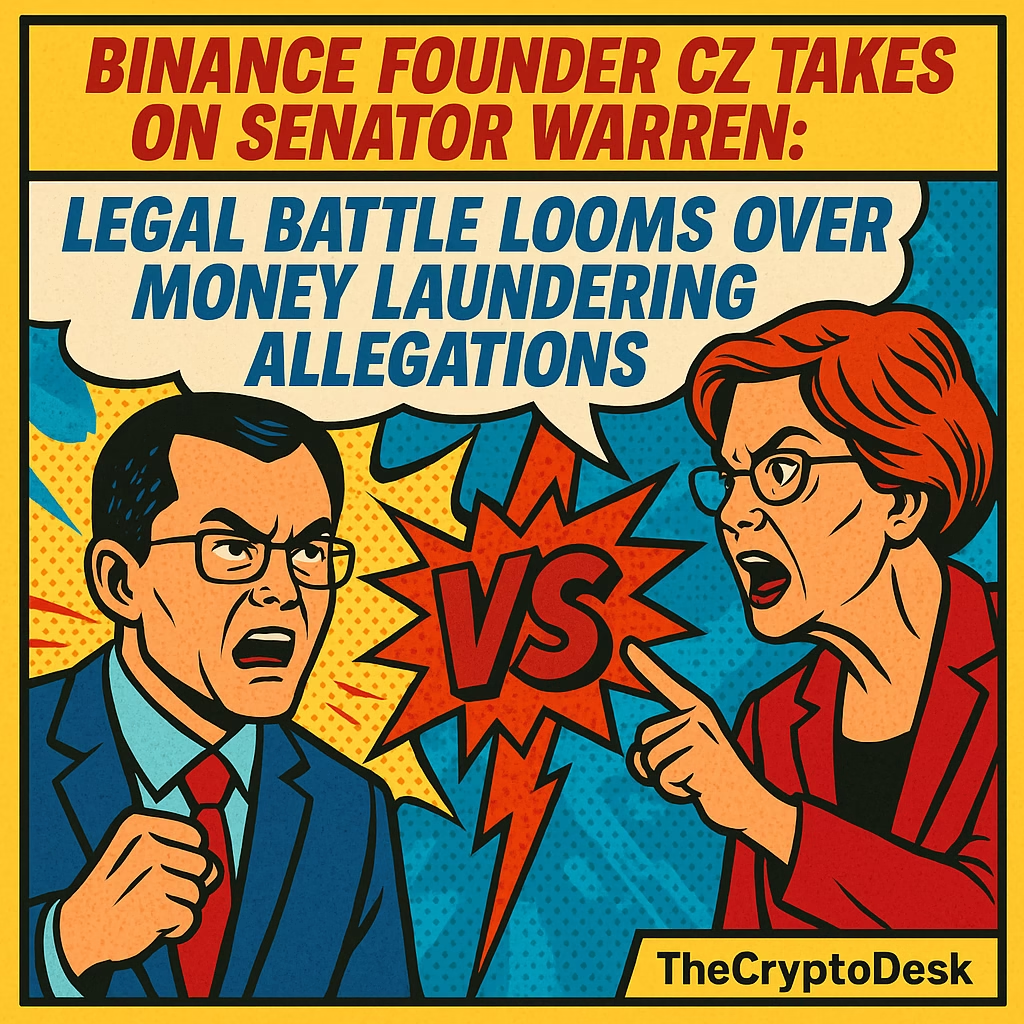In a fiery clash that combines politics and cryptocurrency, Binance founder Changpeng “CZ” Zhao has escalated tensions with U.S. Senator Elizabeth Warren, threatening legal action for defamation. This dramatic standoff follows Warren’s assertive claims on social media that CZ was guilty of money laundering—allegations that his legal team vehemently denies, stating they are not only misleading but also detrimental to his reputation.
CZ pleaded guilty to a criminal money laundering charge and was sentenced to prison. But then he financed President Trump’s stablecoin and lobbied for a pardon. Today, he got it. If Congress does not stop this kind of corruption, it owns it. pic.twitter.com/NsWeaJcVeK— Elizabeth Warren (@SenWarren) October 23, 2025
This heated exchange erupted shortly after President Donald Trump granted a pardon to Zhao last week, effectively erasing the consequences of a plea deal that had previously subjected him to four months in prison and a hefty $50 million fine. Interestingly, while Zhao did plead guilty, it was not for money laundering, but for failing to uphold an effective anti-money laundering program at Binance, raising significant questions about Warren’s claims.
Warren’s post on X (formerly Twitter) quickly ignited backlash from legal experts and social media users alike. She accused Zhao of engaging in corrupt activity having funded Trump’s stablecoin initiative, followed by a successful bid for clemency. Critics were quick to point out that Zhao’s actual legal troubles stemmed from compliance issues under the Bank Secrecy Act, not the criminal money laundering narrative that Warren painted.
🧨 @SenWarren torched Trump’s pardon of Binance founder Changpeng Zhao @cz_binance, calling the move “corruption” and urging Congress to step in. #CZ #TrumpPardon https://t.co/M9GD3yylkm— Cryptonews.com (@cryptonews) October 24, 2025
X itself added a note clarifying that Zhao “did not plead guilty to money laundering,” emphasizing the technicality of his plea. His lawyer, Teresa Goody Guillen, stated that a formal demand for retraction would soon follow if Warren does not correct her statements. “Mr. Zhao will not remain silent while a United States Senator seemingly misuses the office to repeatedly publish defamatory statements that impugn his reputation,” Guillen asserted.
The crux of this dispute lies in Warren’s unsubstantiated assertion of money laundering, which is absent from Zhao’s legal records. The Justice Department had charged him primarily for compliance failures that allowed illicit transactions on Binance, including those linked to sanctioned entities. The outcome was monumental—Binance paid one of the largest corporate fines in U.S. history totaling $4.3 billion, leading to Zhao’s resignation as CEO.
⚖️💸 Judge Approves Settlement: Binance to Pay $1.5 Billion to CFTC, CZ to Pay $150 Million FineJudge Manish Shah has issued a verdict ordering @cz_binance to pay $2.85 billion to the Commodity Futures Trading Commission (CFTC). #CryptoNews #news https://t.co/h3uRNSl5l9— Cryptonews.com (@cryptonews) December 19, 2023
To date, Warren’s office has remained silent on the possibility of retraction. Responding to Zhao’s legal threat, a spokesperson noted that the senator was consistent in her position, reiterating, “He pleaded guilty to violating the law” in her appearance on Fox Business. Warren, along with California Democrat Adam Schiff, is furthermore advocating for a congressional investigation into what they term “political corruption” intertwined with Trump’s crypto connections.
With regard to Trump’s presidential pardons, tensions are rising. Zhao, with his considerable wealth estimated at $61 billion, denies any involvement with financing Trump’s stablecoin, an initiative launched by the Trump family’s company, World Liberty Financial. Reports suggesting Binance’s code was leveraged in the token’s design have been categorically dismissed by Zhao as “misinformation” and a “hit piece” aimed at tarnishing his image.
🚨 @Binance played a critical role in developing the USD1 stablecoin launched by the Trump family’s World Liberty Financial Inc. #Binance #Trump https://t.co/TefR8YIKoQ— Cryptonews.com (@cryptonews) July 11, 2025
The potential lawsuit against Senator Warren illustrates Zhao’s determination to defend his reputation. Experts weigh in on the implications of such a legal move. While Congress members are generally shielded from liability under the Constitution’s Speech or Debate Clause during official duties, this protection does not extend to comments made on social platforms—alluding to a narrower interpretation of what constitutes official discourse. Guillen pointedly noted that “Immunity ≠ Impunity,” emphasizing that the transmission of defamatory statements is not protected.
Worth remembering Hutchinson v. Proxmire, 443 U.S. 111 (1979). The Speech or Debate Clause protects debate/legislative acts—not false and misleading information. The court held that the Clause does not protect the transmittal of allegedly defamatory material in press releases and…— Teresa Goody Guillén (@teresagoody) October 24, 2025
This isn’t Zhao’s first rodeo with legal disputes over defamation. In 2022, he filed a suit against Bloomberg’s Hong Kong publisher for categorizing Binance as a “Ponzi scheme.” That case concluded in 2024 with a retraction and an acknowledged apology from the publisher, along with a charitable donation.
As the saga unfolds, the implications extend far beyond this single dispute. Zhao’s pardon is igniting a larger debate in Congress regarding crypto regulation. Representative Ro Khanna has introduced legislation aimed at prohibiting elected officials from owning or launching cryptocurrencies, citing the Zhao case as an egregious example of “blatant corruption.” Similarly, Representative Maxine Waters condemned the pardon for its potential to “legitimize crypto crime,” warning it undermines crucial efforts at federal law enforcement.
In a landscape where the intersection of cryptocurrency and politics is fraught with complexities, what implications will this confrontation hold for the future of regulation in the crypto space? As developments continue, one thing is clear: the upcoming legal battles and political narratives will have lasting effects on how the cryptocurrency ecosystem evolves and operates in tandem with government oversight.
Stay tuned for updates on this transformative narrative in the cryptocurrency world, and consider engaging with us—what are your thoughts on the intersection of political influence and crypto? Share your insights and join the conversation!
